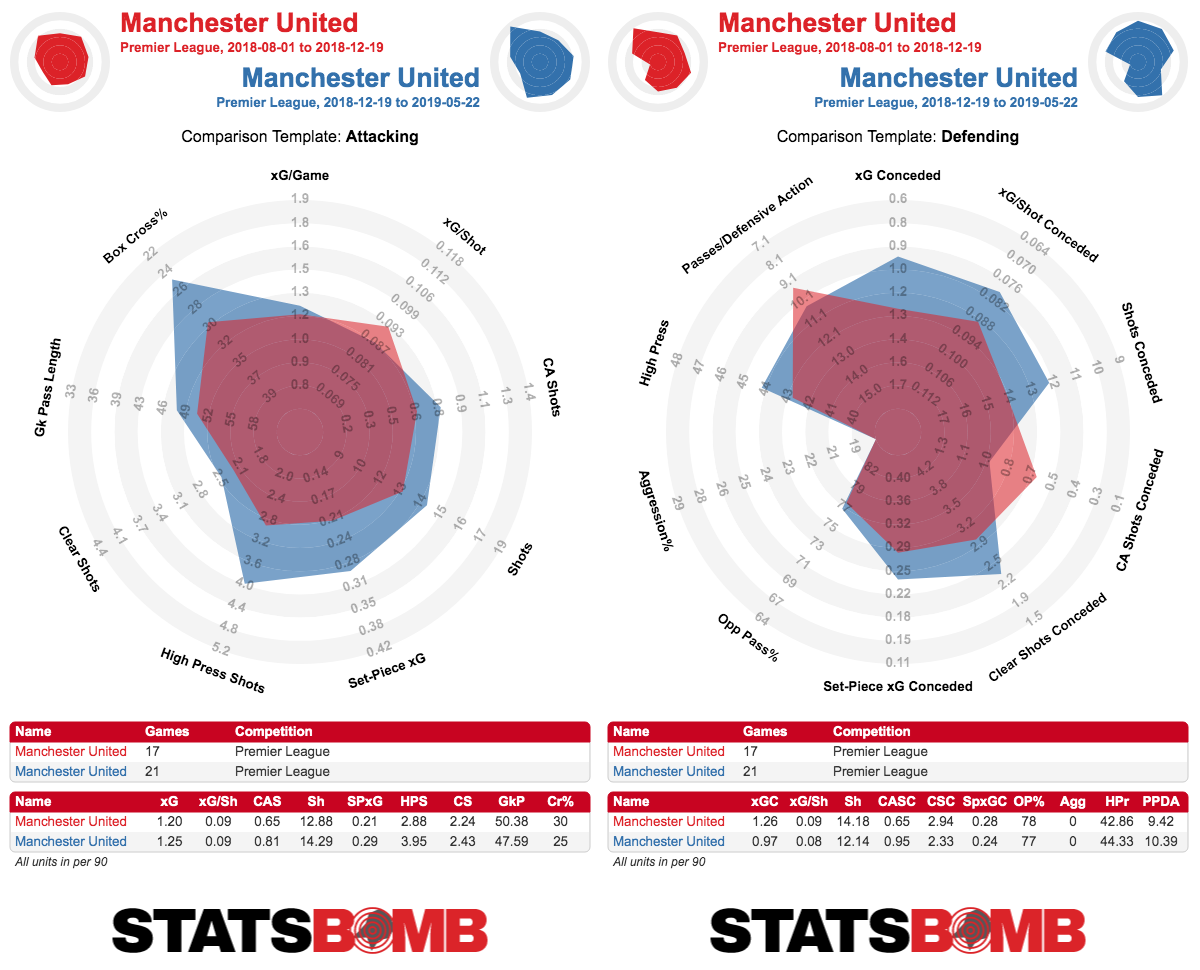In what might sum up the last five years at Manchester United, this season saw a blend of utter chaos, false dawns, and a real sense that no one is quite sure how to get this football club going again. Looking at the trendlines, it’s pretty easy to spot what the major narratives were at Old Trafford. Another Jose Mourinho meltdown for the first half of the season led to poor numbers, while David De Gea’s heroics in 2017/18 were unable to continue and all the problems in this side came home to roost. Subsequently, Ole Gunnar Solskjaer came in and saw a genuine improvement in the side’s performances boosted by a huge positive finishing skew, convincing the board that the Norwegian was the man for the long haul. Then, as the fixture list toughened up, the team inevitably had a dip in performance, but this had the bad fortune of being met by a return to league average finishing at both ends, amplifying a view that everything had once again gone wrong at Old Trafford. 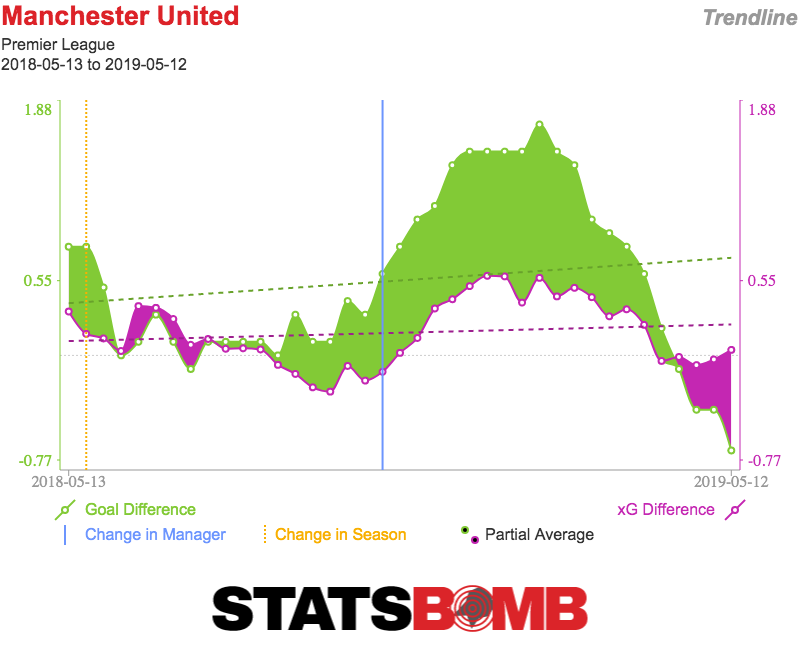 Even considering the troubles they had down the stretch, Solskjaer was certainly a better United manager than Mourinho this season. The new boss saw the expected goal difference per game rise from a previously catastrophic -0.06 to a merely mediocre 0.28. This improvement was seen on both sides of the ball, as well, with United being slightly more effective both as an attacking and defending unit.
Even considering the troubles they had down the stretch, Solskjaer was certainly a better United manager than Mourinho this season. The new boss saw the expected goal difference per game rise from a previously catastrophic -0.06 to a merely mediocre 0.28. This improvement was seen on both sides of the ball, as well, with United being slightly more effective both as an attacking and defending unit. 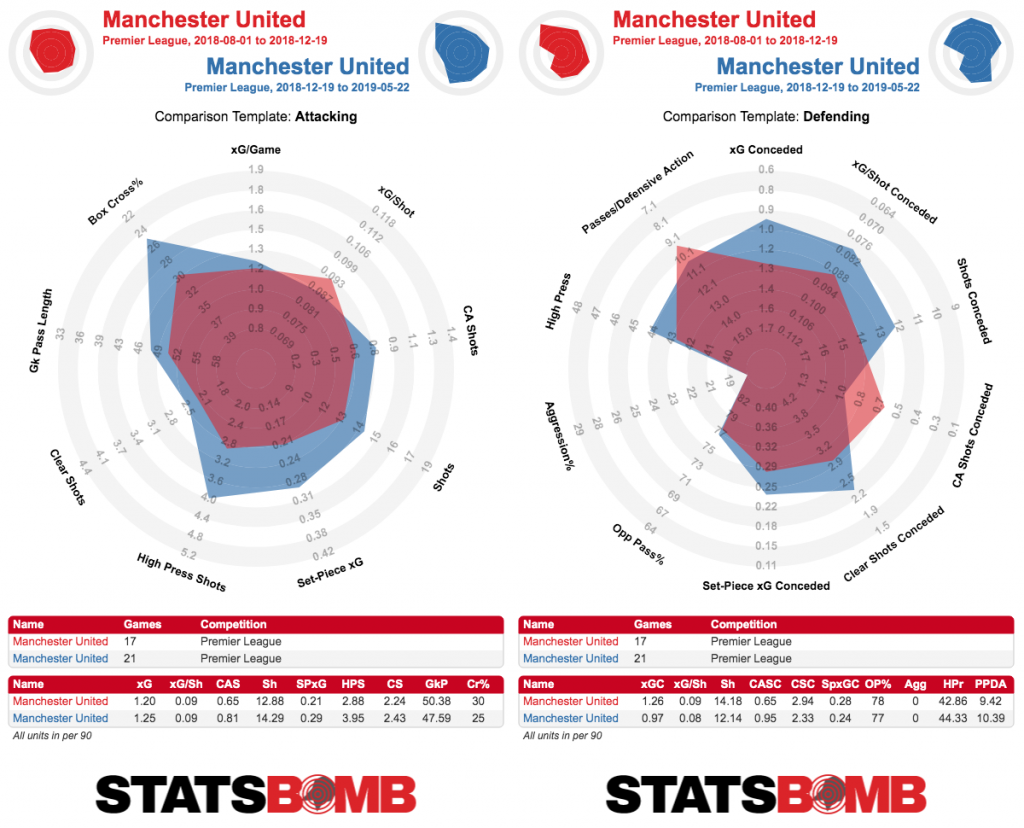 As witnessed in the high press rating on the radar above, Solskjaer had the team defending from a position slightly higher up the pitch, even as his team were more comfortable allowing the opposition to retain the ball. That Solskjaer’s United were able to concede both fewer shots and shots of lower average quality than previously speaks to either genuinely impressive work from him or the awful state he found the club in after Mourinho. On the attacking end, perhaps because this phase of the game is more reliant on individual quality, things didn’t see quite a huge jump, but an improvement was still made. United took just under 1.5 extra shots per game, and even if Solskjaer’s less structured style saw the shot quality dip a touch, this still worked out as an improvement. Upon arriving, Solskjaer had relatively little time available for training tactics and thus opted to keep things fairly simple. A narrow 4-3-3 system that seemed to allow most of the side’s key players to shine in their best roles was favoured. The front three of Marcus Rashford Anthony Martial and Jesse Lingard kept things fluid and interchangeable, offering something of a budget version of Liverpool’s attack (ok, United aren’t exactly working on a tight budget, but Solskjaer could only play the hand he was dealt). In midfield, the main concern seemed to be giving Paul Pogba a platform in which he could make forward runs and join the attackers with relative ease. Lone pivot Nemanja Matic can’t cover the ground he once was able to, so Ander Herrera was added to the starting lineup to help clean up any messes. The system found success straight away, with the Norwegian’s first game against Cardiff showing the shape clearly in the passmap.
As witnessed in the high press rating on the radar above, Solskjaer had the team defending from a position slightly higher up the pitch, even as his team were more comfortable allowing the opposition to retain the ball. That Solskjaer’s United were able to concede both fewer shots and shots of lower average quality than previously speaks to either genuinely impressive work from him or the awful state he found the club in after Mourinho. On the attacking end, perhaps because this phase of the game is more reliant on individual quality, things didn’t see quite a huge jump, but an improvement was still made. United took just under 1.5 extra shots per game, and even if Solskjaer’s less structured style saw the shot quality dip a touch, this still worked out as an improvement. Upon arriving, Solskjaer had relatively little time available for training tactics and thus opted to keep things fairly simple. A narrow 4-3-3 system that seemed to allow most of the side’s key players to shine in their best roles was favoured. The front three of Marcus Rashford Anthony Martial and Jesse Lingard kept things fluid and interchangeable, offering something of a budget version of Liverpool’s attack (ok, United aren’t exactly working on a tight budget, but Solskjaer could only play the hand he was dealt). In midfield, the main concern seemed to be giving Paul Pogba a platform in which he could make forward runs and join the attackers with relative ease. Lone pivot Nemanja Matic can’t cover the ground he once was able to, so Ander Herrera was added to the starting lineup to help clean up any messes. The system found success straight away, with the Norwegian’s first game against Cardiff showing the shape clearly in the passmap. 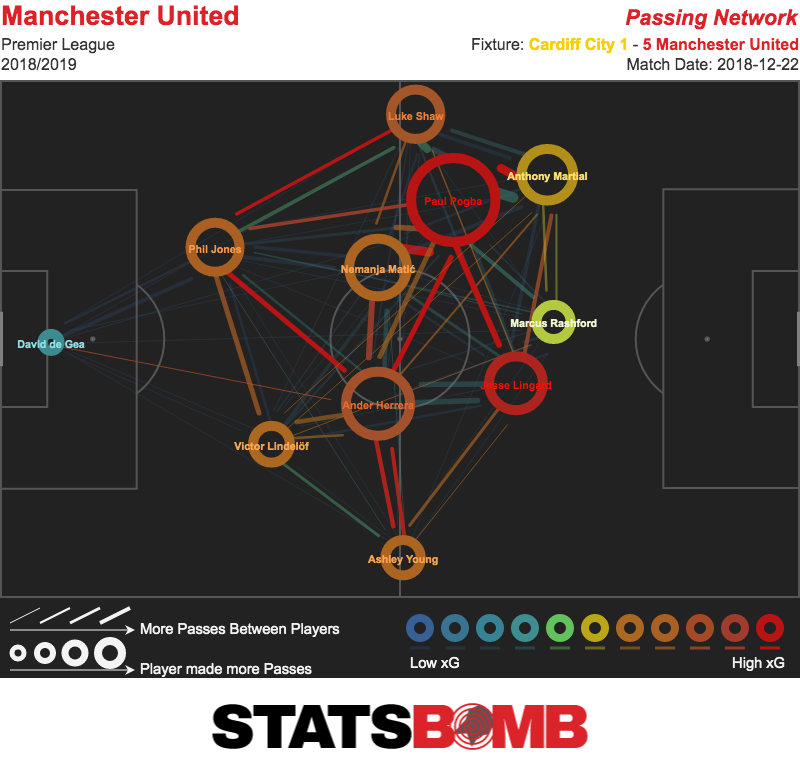 While ideally Solskjaer would want to spend time honing this system, fate had another plan, and injuries struck. Seemingly being less than entirely convinced by his options in the midfield three, and having to use the much less mobile Juan Mata in attack at times, Solskjaer began experimenting with a number of different systems. In big games, he would often favour a back three even if the ideal personnel were not available, such as the first leg home defeat to Barcelona in which Luke Shaw played at centre back.
While ideally Solskjaer would want to spend time honing this system, fate had another plan, and injuries struck. Seemingly being less than entirely convinced by his options in the midfield three, and having to use the much less mobile Juan Mata in attack at times, Solskjaer began experimenting with a number of different systems. In big games, he would often favour a back three even if the ideal personnel were not available, such as the first leg home defeat to Barcelona in which Luke Shaw played at centre back. 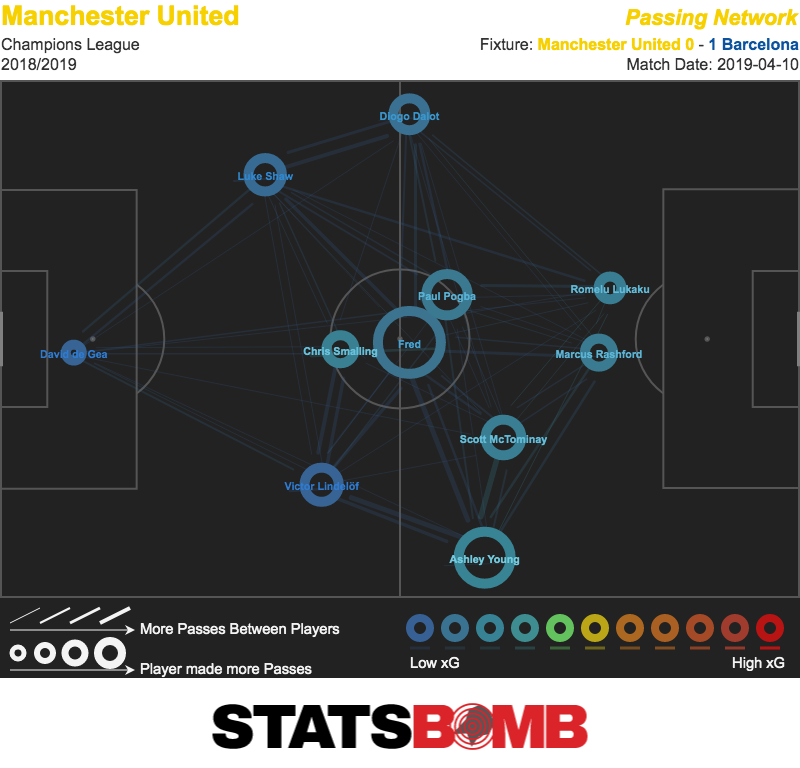 In the closing stages of the season, as some of the injury problems cleared up a touch, he often opted for a 4-4-2 diamond, here with Mata behind the two strikers.
In the closing stages of the season, as some of the injury problems cleared up a touch, he often opted for a 4-4-2 diamond, here with Mata behind the two strikers. 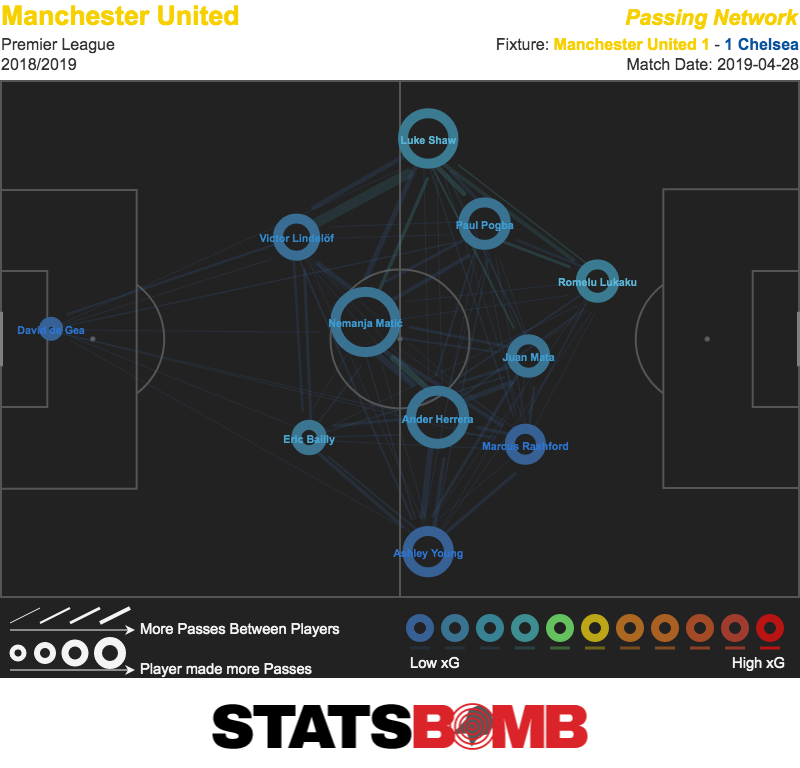 Granted, much of it was out of Solskjaer’s control, but this tactical tinkering didn’t seem to help the side much. The players were already attempting to adjust to a new style of play from Mourinho’s approach, and adding a number of new formations to learn only seemed to make things more difficult. In terms of individuals, it seems that the conversation around the club will always start with Pogba. In the first half of the season, it seemed as though he was sucked into the same Mourinho vortex as everyone else, with the manager supposedly frustrated by Pogba off the field. He continued in the broadly deeper role that Mourinho had preferred him in, and wasn’t bad exactly, but few would argue he was at his sparkling best. Things took a dramatic u-turn when Solskjaer arrived, played him as a nominal central midfielder with freedom to join the attack, and the Frenchman started having a lot of fun. This lasted throughout the winter months, with Pogba arguably performing as the best player in the Premier League over this period, until it all seemed to fall apart. The biggest factor in his disappointing form in recent months, one suspects, was Solskjaer’s tinkering forcing him to play increasingly conservative, positionally strict roles. Some have questioned his attitude, though these claims have never been backed up by any real evidence. Whatever the cause, though, Pogba’s output saw a very concerning drop off since mid-February.
Granted, much of it was out of Solskjaer’s control, but this tactical tinkering didn’t seem to help the side much. The players were already attempting to adjust to a new style of play from Mourinho’s approach, and adding a number of new formations to learn only seemed to make things more difficult. In terms of individuals, it seems that the conversation around the club will always start with Pogba. In the first half of the season, it seemed as though he was sucked into the same Mourinho vortex as everyone else, with the manager supposedly frustrated by Pogba off the field. He continued in the broadly deeper role that Mourinho had preferred him in, and wasn’t bad exactly, but few would argue he was at his sparkling best. Things took a dramatic u-turn when Solskjaer arrived, played him as a nominal central midfielder with freedom to join the attack, and the Frenchman started having a lot of fun. This lasted throughout the winter months, with Pogba arguably performing as the best player in the Premier League over this period, until it all seemed to fall apart. The biggest factor in his disappointing form in recent months, one suspects, was Solskjaer’s tinkering forcing him to play increasingly conservative, positionally strict roles. Some have questioned his attitude, though these claims have never been backed up by any real evidence. Whatever the cause, though, Pogba’s output saw a very concerning drop off since mid-February. 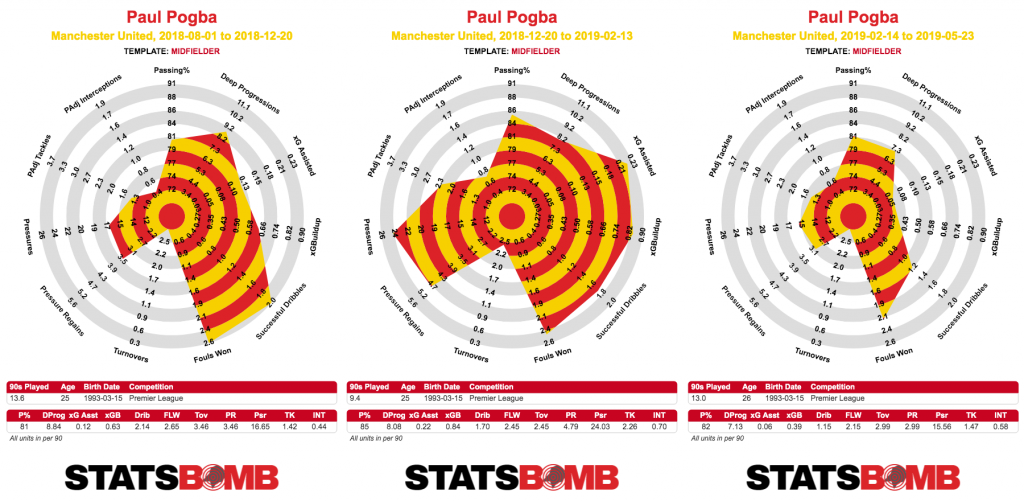 The story is similar with Rashford. In the part of the season where United were flying, it seemed as though he was ready to make the leap, to lead the line for the club and evolve into one of the Premier League’s better forwards. In Rashford’s case, one could point to the injury he picked up in March as causing issues, as well as the team’s poorer performances late in the season, but he was ultimately unable to perform consistently across the whole year. This was his best season in terms of goals and assists, and at age 21 he still has significant scope for improvement, but as of right now, the idea of Rashford is still more exciting than the real thing.
The story is similar with Rashford. In the part of the season where United were flying, it seemed as though he was ready to make the leap, to lead the line for the club and evolve into one of the Premier League’s better forwards. In Rashford’s case, one could point to the injury he picked up in March as causing issues, as well as the team’s poorer performances late in the season, but he was ultimately unable to perform consistently across the whole year. This was his best season in terms of goals and assists, and at age 21 he still has significant scope for improvement, but as of right now, the idea of Rashford is still more exciting than the real thing. 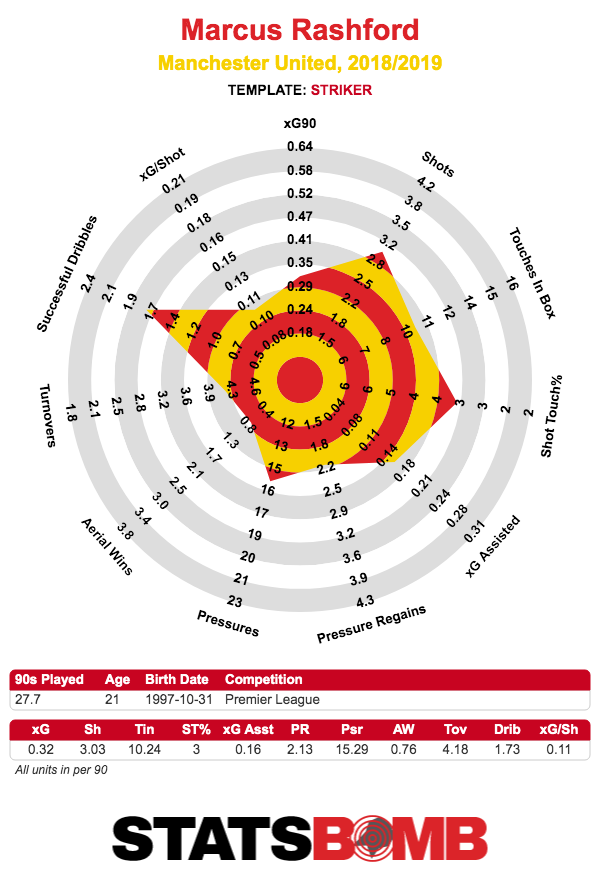 The standout performer of the past several seasons, David De Gea, has been on the receiving end of criticism in recent months. The goalkeeper’s 17/18 season was out of this world good, and perhaps he was set to fall after inevitably failing to reach these standards again. While spring proved fairly shaky for him, his excellent form over winter put him once more as an above average Premier League shot stopper, at the very least. There can sometimes come a point in a ‘keeper’s career when they suddenly hit the wall and decline very quickly, but there is not yet enough evidence to point to this for De Gea. Don’t rule out him regaining his title as the best man between the sticks in the Premier League next season.
The standout performer of the past several seasons, David De Gea, has been on the receiving end of criticism in recent months. The goalkeeper’s 17/18 season was out of this world good, and perhaps he was set to fall after inevitably failing to reach these standards again. While spring proved fairly shaky for him, his excellent form over winter put him once more as an above average Premier League shot stopper, at the very least. There can sometimes come a point in a ‘keeper’s career when they suddenly hit the wall and decline very quickly, but there is not yet enough evidence to point to this for De Gea. Don’t rule out him regaining his title as the best man between the sticks in the Premier League next season. 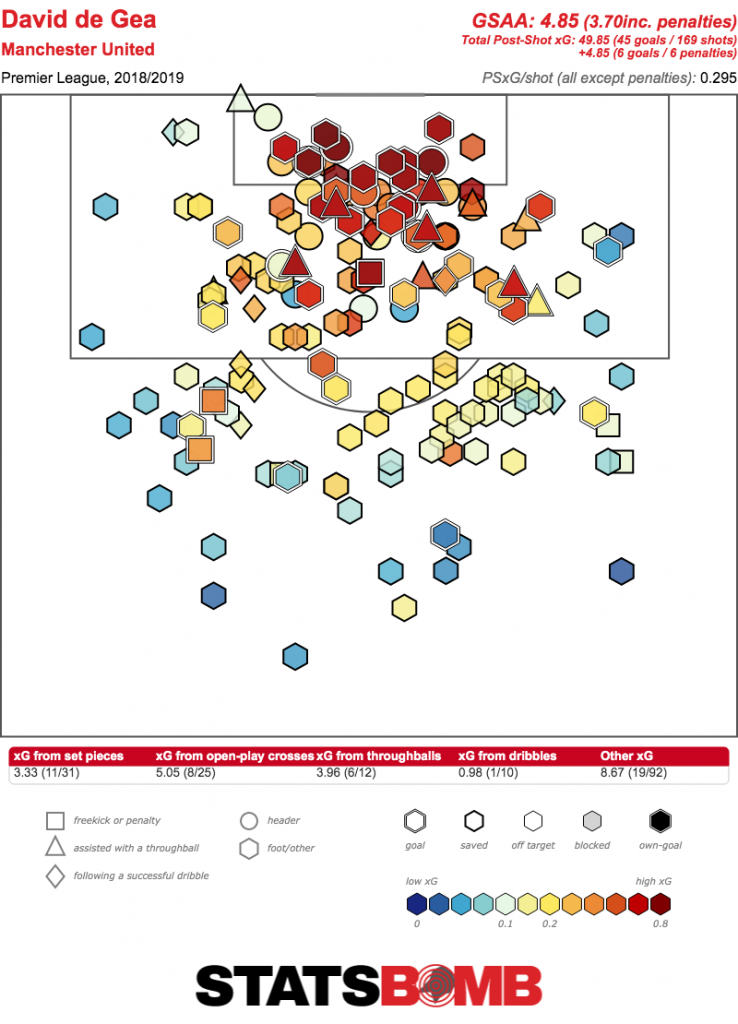 It’s hard not to feel as though Herrera’s decision to leave the club on a free transfer could significantly hurt United next year. With Matic’s age showing, and Pogba’s best work often done in the final third, Herrera had to get through a lot of defensive work in that midfield, and he did it to great effect. With Fred seemingly unfavoured by Solskjaer, Scott McTominay showing character and height but little else, and Andreas Pereira yet to prove he is the star many United fans hoped he would be, there’s something of a void in a midfield that needs overhauling.
It’s hard not to feel as though Herrera’s decision to leave the club on a free transfer could significantly hurt United next year. With Matic’s age showing, and Pogba’s best work often done in the final third, Herrera had to get through a lot of defensive work in that midfield, and he did it to great effect. With Fred seemingly unfavoured by Solskjaer, Scott McTominay showing character and height but little else, and Andreas Pereira yet to prove he is the star many United fans hoped he would be, there’s something of a void in a midfield that needs overhauling. 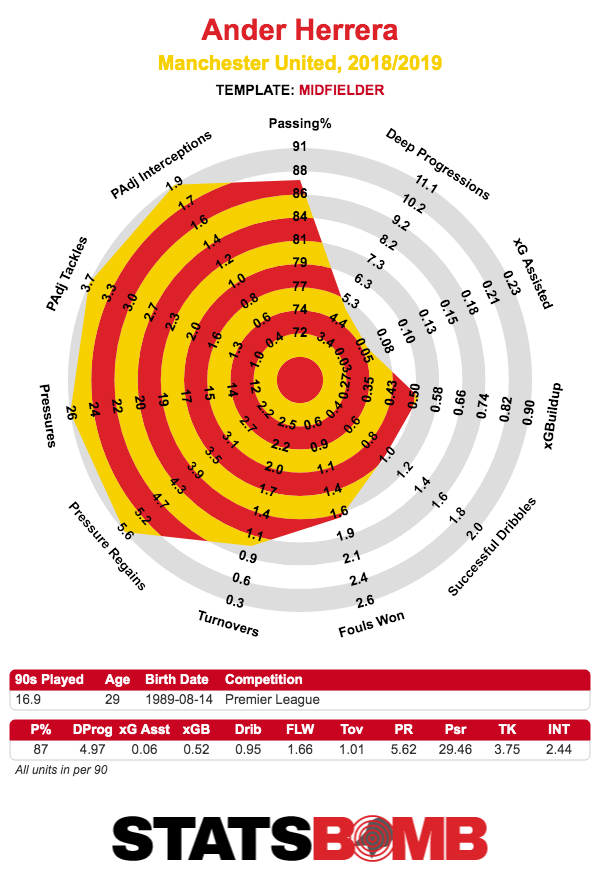 Looking forward, United’s new structure of Solskjaer, assistant manager Mike Phelan and potentially sporting director Darren Fletcher do at least seem to be aware that this is a long term rebuilding project. The players the club are being linked with, such as Aaron Wan-Bissaka, Sean Longstaff, Daniel James, Declan Rice and Jadon Sancho indicate an awareness that United should be looking toward younger players for a side that might not be ready to challenge for top trophies in the next two years. Whether this management team is identifying the correct talent is very much an open question, as they do not yet have much of a track record to go on. Of course, United do not lack for financial resources, and a move toward locking down some of the best players in a very exciting generation of young British players would not necessarily be a mistake. What does seem likely, though, is that the next few years at Old Trafford could be something of a slog, even if they do eventually bear fruit.
Looking forward, United’s new structure of Solskjaer, assistant manager Mike Phelan and potentially sporting director Darren Fletcher do at least seem to be aware that this is a long term rebuilding project. The players the club are being linked with, such as Aaron Wan-Bissaka, Sean Longstaff, Daniel James, Declan Rice and Jadon Sancho indicate an awareness that United should be looking toward younger players for a side that might not be ready to challenge for top trophies in the next two years. Whether this management team is identifying the correct talent is very much an open question, as they do not yet have much of a track record to go on. Of course, United do not lack for financial resources, and a move toward locking down some of the best players in a very exciting generation of young British players would not necessarily be a mistake. What does seem likely, though, is that the next few years at Old Trafford could be something of a slog, even if they do eventually bear fruit.
2019
Manchester United Season Review: At the Wheel?
By admin
|
May 23, 2019
